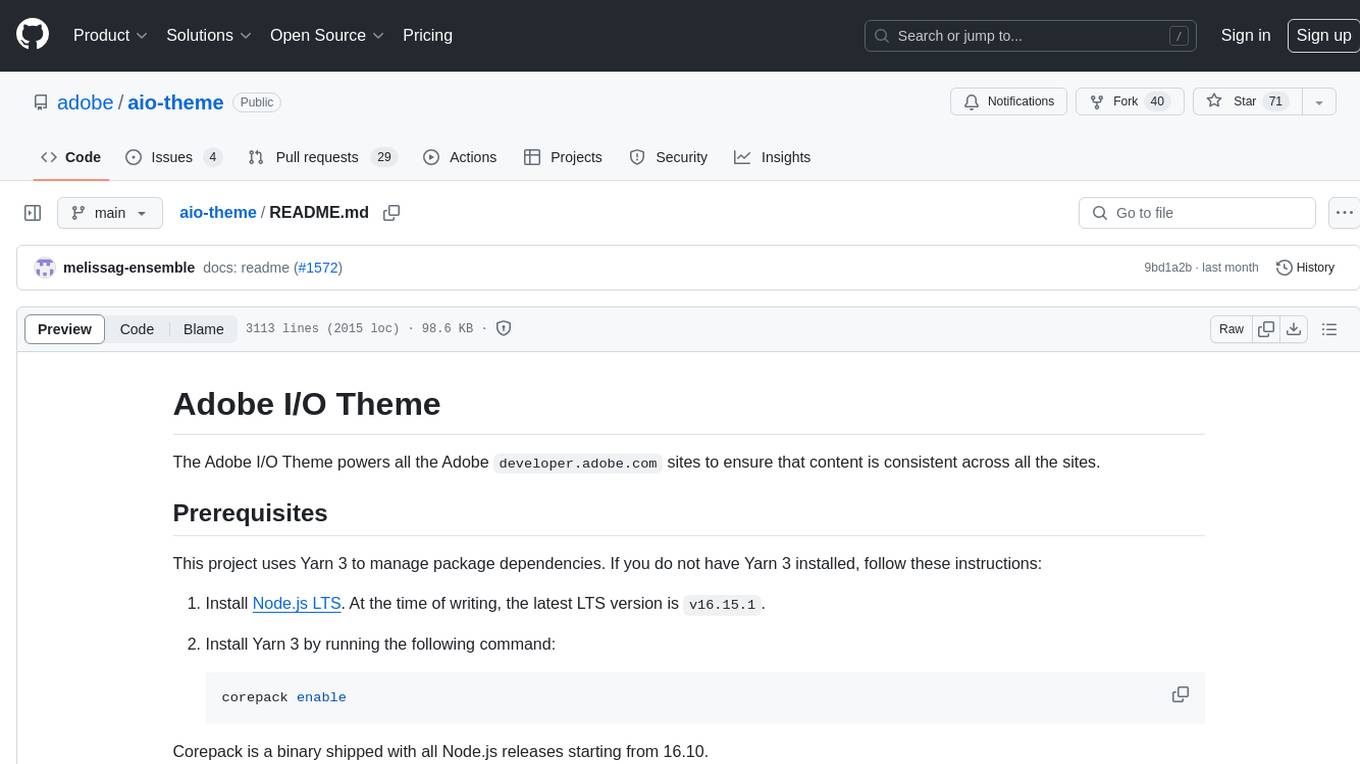
tiledesk-dashboard
Tiledesk is the open source AI agent builder, written in Node.js and Angular. This repository is dedicated to the WebApp dashboard to manage Tiledesk: open-source alternative to Voiceflow, enabling easy creation of advanced LLM-powered Agents with seamless human-in-the-loop (HITL).
Stars: 295
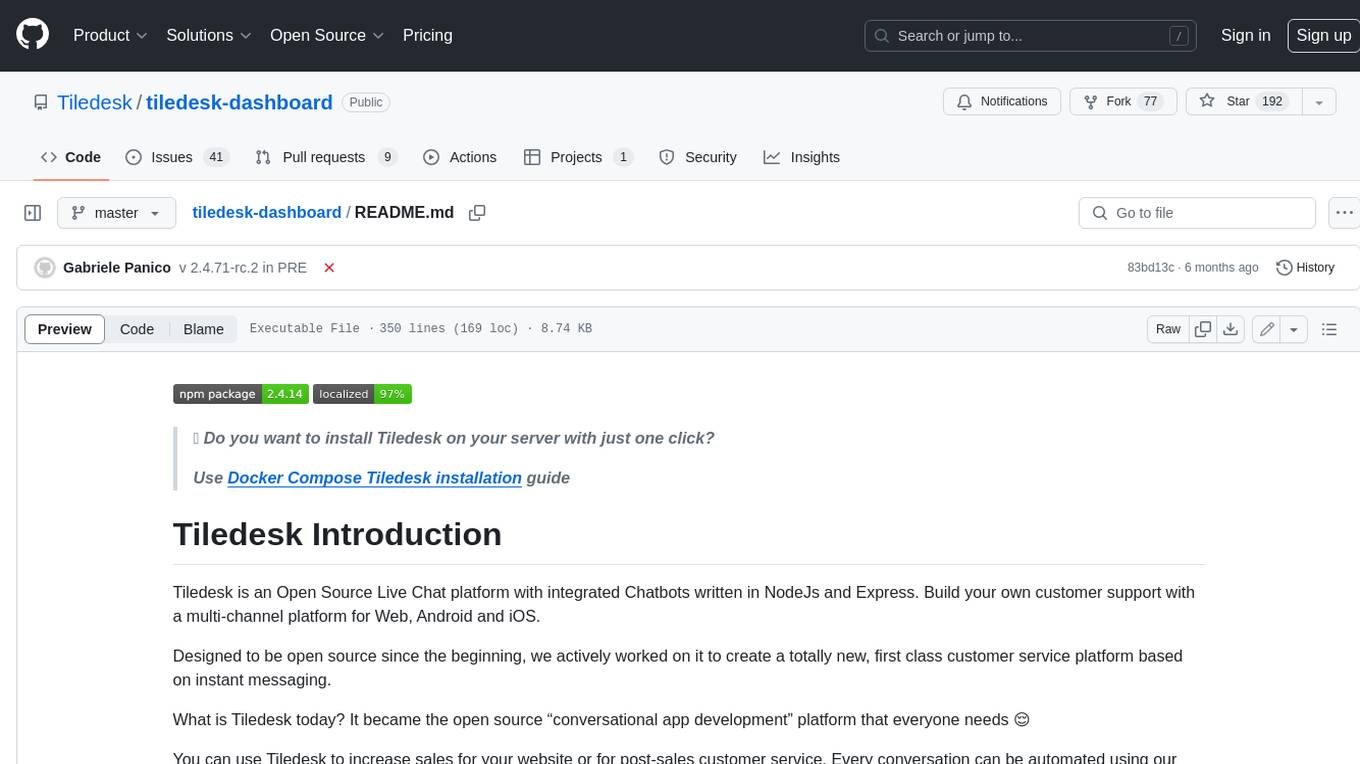
Tiledesk is an open-source live chat platform with integrated chatbots written in Node.js and Express. It is designed to be a multi-channel platform for web, Android, and iOS, and it can be used to increase sales or provide post-sales customer service. Tiledesk's chatbot technology allows for automation of conversations, and it also provides APIs and webhooks for connecting external applications. Additionally, it offers a marketplace for apps and features such as CRM, ticketing, and data export.
README:
🚀 Do you want to install Tiledesk on your server with just one click?
Use Docker Compose Tiledesk installation guide
Tiledesk is an Open Source Live Chat platform with integrated Chatbots written in NodeJs and Express. Build your own customer support with a multi-channel platform for Web, Android and iOS.
Designed to be open source since the beginning, we actively worked on it to create a totally new, first class customer service platform based on instant messaging.
What is Tiledesk today? It became the open source “conversational app development” platform that everyone needs 😌
You can use Tiledesk to increase sales for your website or for post-sales customer service. Every conversation can be automated using our first class native chatbot technology. You can also connect your own applications using our APIs or Webhooks. Moreover you can deploy entire visual applications inside a conversation. And your applications can converse with your chatbots or your end-users! We know this is cool 😎
Tiledesk is multichannel in a totally new way. You can write your chatbot scripts with images, buttons and other cool elements that your channels support. But you will configureyour chatbot replies only once. They will run on every channel, auto-adapting the responses to the target channel whatever it is, Whatsapp, Facebook Messenger, Telegram etc.
Tiledesk.com backoffice application is available on GitHub under MIT licence.
Follow this instructions to setup the environment.
Consider that Tiledesk.com cloud service makes every module available with the same open source licence.
-
Web Widget component
-
iOS Widget API (work in progress)
-
full iOS App
-
full Android App
-
Tiledesk Dashboard (this repo)
-
All the chat components are available thanks to the Chat21 open source project, also available on GitHub (https://github.com/chat21)
- If you need help or just want to hang out, come, say hi on our
Discord server.
- You can also to ask for support on https://tiledesk.com, using the live chat widget on the the website.
- Unlimited chat conversations
- Widget customization tools
- Conversation labels and notes
- Apps marketplace
- CRM
- Operating hours
- Up to 200,000 messages from bot/month
- Departments and agents groups
- Chat history
- Ticketing System
- Data export + Analytics
- Canned responses
And more.
-
Install Node and NPM (https://nodejs.org/en). Suggested: node v14.15.5 (npm v6.14.11).
-
If you want to to manage multiple active Node.js versions, to install node use the tool Node Version Manager (NVM)
-
Install angular-cli v7.3.10 with
npm install -g @angular/[email protected] -
tiledesk-server installed and running (https://github.com/Tiledesk/tiledesk-server.git)
Do you want to install all the Tiledesk components on your server with just one click? Use Docker Compose Tiledesk installation guide
Install the latest stable release. Check on Github page the last release under the Releases tab and then run
-
git clone https://github.com/Tiledesk/tiledesk-dashboard.git --branch <LATEST-RELEASE-VERSION> -
cd tiledesk-dashboard -
npm install
You can put your API URL and the other settings directly in the environment.*.ts if remoteConfig is set to false or in the dashboard-config.json if remoteConfig is set to true.
If remoteConfig is set to true create a file name dashboard-config.json and put it into src folder.
An example of the configuration of the environment.ts file in src/environments/
export const environment = {
production: false,
remoteConfig: true,
remoteConfigUrl: "/dashboard-config.json",
VERSION: require('../../package.json').version,
...
}WIDGET_BASE_URL: "https://<YOUR_CHAT21_WEB_WIDGET_URL>:4200/",
botcredendialsURL: "https://<YOUR_BOT_CREDENTIALS_URL>",
SERVER_BASE_URL: "https://<YOUR_TILEDESK_SERVER>/",
CHAT_BASE_URL: "https://<YOUR_CHAT21_IONIC_URL>/chat",
globalRemoteJSSrc: "https://<YOUR_CUSTOM_SCRIPT_1>, https://<YOUR_CUSTOM_SCRIPT_2>" // see the section below "Load external scripts"
firebaseAuth : false,
chatEngine: "mqtt", // OR YOUR CUSTOM CHAT ENGINE
updloaEngine: "native", // OR YOUR CUSTOM UPLOAD ENGINE
pushEngine:"none", // OR YOUR CUSTOM PUSH ENGINE
logLevel: "<YOUR-PREFERRED-LOG-LEVEL>",
wsUrl: 'ws://' + window.location.hostname + '/ws/'
};-
logLevel: The Dashboard supports 4 log levels. The order is as follows:Error < Warn < Info < Debug
Run the app with ng serve
For production installation, configure the environment.prod.ts file in src/environments/.
export const environment = {
production: false,
remoteConfig: false,
VERSION: require('../../package.json').version,
...Run ng build --prod --base-href ./
Copy the content of the dist folder to your Web Server (for example Apache or Nginx)
aws s3 sync ./dist/ s3://tiledesk-dashboard/dashboard
To run Tiledesk-dashboard on port 4500 run:
curl https://raw.githubusercontent.com/Tiledesk/tiledesk-dashboard/master/.env.sample --output .env
nano .env #configure .env file properly
docker run -p 4500:80 --env-file .env tiledesk/tiledesk-dashboard
To run Tiledesk-dashboard with npm:
UNDER DEVELOPMENT
curl https://raw.githubusercontent.com/Tiledesk/tiledesk-dashboard/master/.env.sample --output .env
nano .env #configure .env file properly
npm install -g @tiledesk/tiledesk-dashboard
tiledesk-dashboard
WIDGET_BASE_URL: "https://<YOUR_CHAT21_WEB_WIDGET_URL>:4200/",
botcredendialsURL: "https://<YOUR_BOT_CREDENTIALS_URL>",
SERVER_BASE_URL: "https://<YOUR_TILEDESK_SERVER>/",
...
brandSrc :"https://<YOUR_BRAND_JSON>/",
...
};SERVER_BASE_URL=YOUR_TILEDESK_SERVER_URL
...
BRAND_SRC=https:YOUR_BRAND_SCRIPT_URL
...
Edit the file _variables.scss in the folder src/assets/sass/md/ to customize the colors
Load external scripts by adding in environment.*.ts (if remoteConfig is set to false or in the dashboard-config.json if remoteConfig is set to true) the key globalRemoteJSSrc with value your scripts separated by commas
WIDGET_BASE_URL: "https://<YOUR_CHAT21_WEB_WIDGET_URL>:4200/",
botcredendialsURL: "https://<YOUR_BOT_CREDENTIALS_URL>",
SERVER_BASE_URL: "https://<YOUR_TILEDESK_SERVER>/",
...
globalRemoteJSSrc :"https://<YOUR_CUSTOM_SCRIPT_1>, https://<YOUR_CUSTOM_SCRIPT_2>",
...
};SERVER_BASE_URL=YOUR_TILEDESK_SERVER_URL
...
REMOTE_JS_SRC=YOUR_CUSTOM_SCRIPT_URL
...
To auto login pass the JWT token as a query parameter of your Dashboard url as in the following example:
"http://localhost:4200/#/project/<YOUR_PROJECT_ID>/home?token=<JWT_TOKEN>"You can run an embedded version of the dashboard inside an existing app using, for example an iframe, as in the following example which display the detail of a conversation (CONVERSATION_ID starts with support-group-XYZ)
"<iframe src='http://localhost:4200/#/project/<YOUR_PROJECT_ID>/request-for-panel/support-group-<CONVERSATION_ID>?token=<JWT_TOKEN'></iframe>"For Tasks:
Click tags to check more tools for each tasksFor Jobs:
Alternative AI tools for tiledesk-dashboard
Similar Open Source Tools

tiledesk-dashboard
Tiledesk is an open-source live chat platform with integrated chatbots written in Node.js and Express. It is designed to be a multi-channel platform for web, Android, and iOS, and it can be used to increase sales or provide post-sales customer service. Tiledesk's chatbot technology allows for automation of conversations, and it also provides APIs and webhooks for connecting external applications. Additionally, it offers a marketplace for apps and features such as CRM, ticketing, and data export.
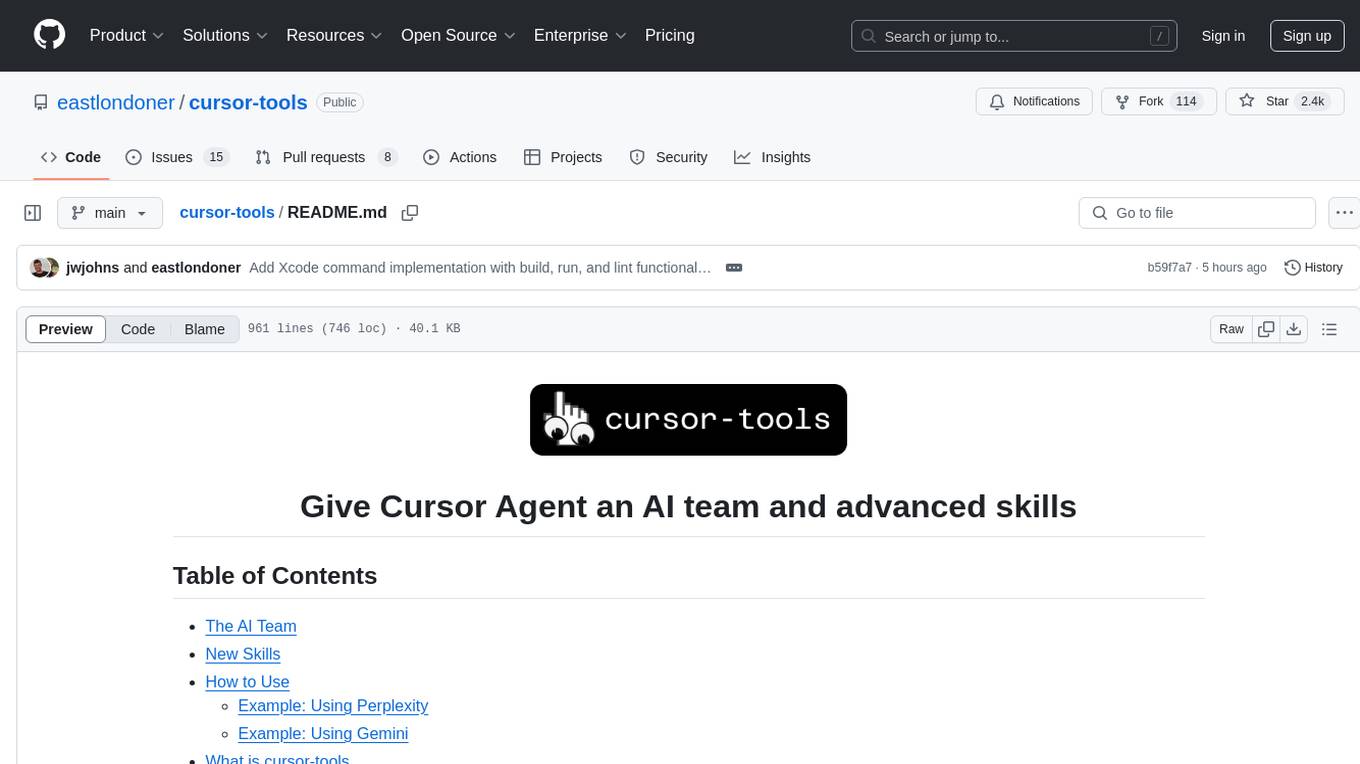
cursor-tools
cursor-tools is a CLI tool designed to enhance AI agents with advanced skills, such as web search, repository context, documentation generation, GitHub integration, Xcode tools, and browser automation. It provides features like Perplexity for web search, Gemini 2.0 for codebase context, and Stagehand for browser operations. The tool requires API keys for Perplexity AI and Google Gemini, and supports global installation for system-wide access. It offers various commands for different tasks and integrates with Cursor Composer for AI agent usage.
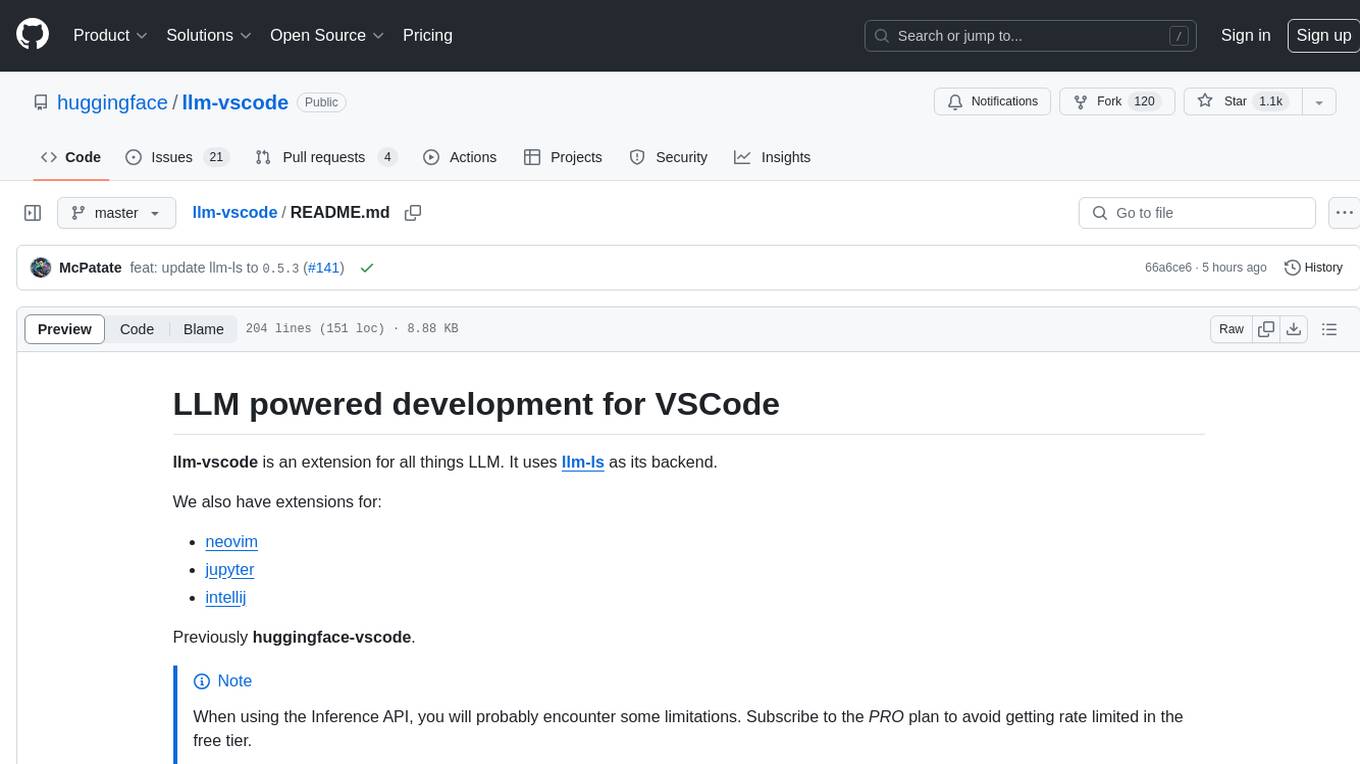
llm-vscode
llm-vscode is an extension designed for all things LLM, utilizing llm-ls as its backend. It offers features such as code completion with 'ghost-text' suggestions, the ability to choose models for code generation via HTTP requests, ensuring prompt size fits within the context window, and code attribution checks. Users can configure the backend, suggestion behavior, keybindings, llm-ls settings, and tokenization options. Additionally, the extension supports testing models like Code Llama 13B, Phind/Phind-CodeLlama-34B-v2, and WizardLM/WizardCoder-Python-34B-V1.0. Development involves cloning llm-ls, building it, and setting up the llm-vscode extension for use.
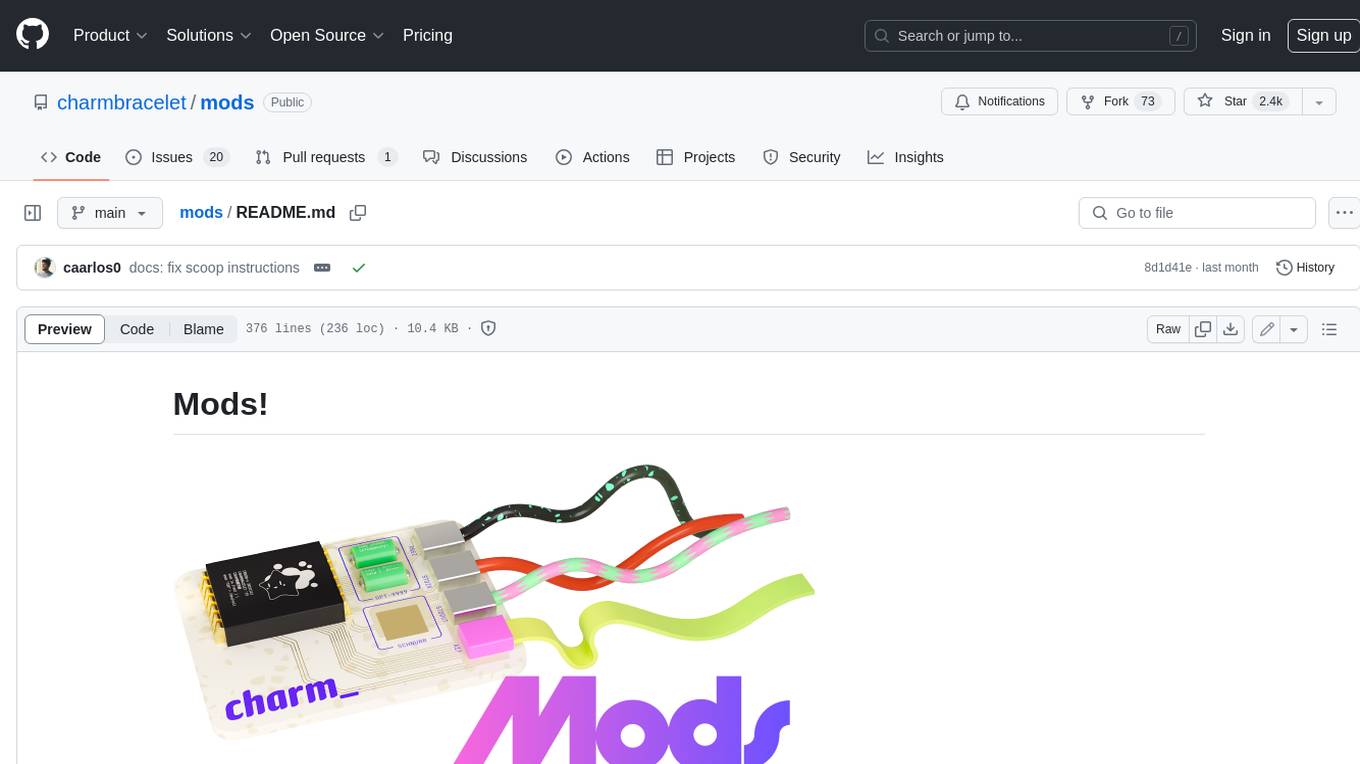
mods
AI for the command line, built for pipelines. LLM based AI is really good at interpreting the output of commands and returning the results in CLI friendly text formats like Markdown. Mods is a simple tool that makes it super easy to use AI on the command line and in your pipelines. Mods works with OpenAI, Groq, Azure OpenAI, and LocalAI To get started, install Mods and check out some of the examples below. Since Mods has built-in Markdown formatting, you may also want to grab Glow to give the output some _pizzazz_.
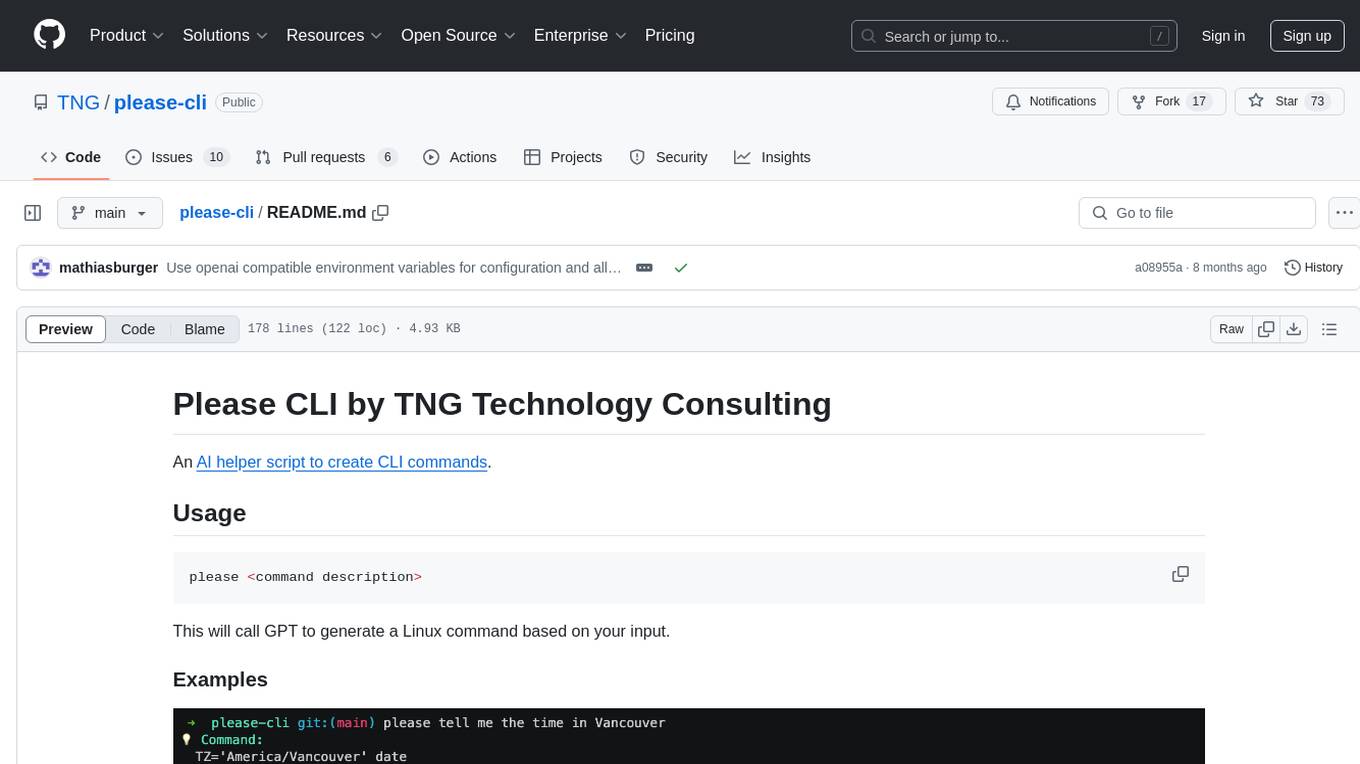
please-cli
Please CLI is an AI helper script designed to create CLI commands by leveraging the GPT model. Users can input a command description, and the script will generate a Linux command based on that input. The tool offers various functionalities such as invoking commands, copying commands to the clipboard, asking questions about commands, and more. It supports parameters for explanation, using different AI models, displaying additional output, storing API keys, querying ChatGPT with specific models, showing the current version, and providing help messages. Users can install Please CLI via Homebrew, apt, Nix, dpkg, AUR, or manually from source. The tool requires an OpenAI API key for operation and offers configuration options for setting API keys and OpenAI settings. Please CLI is licensed under the Apache License 2.0 by TNG Technology Consulting GmbH.
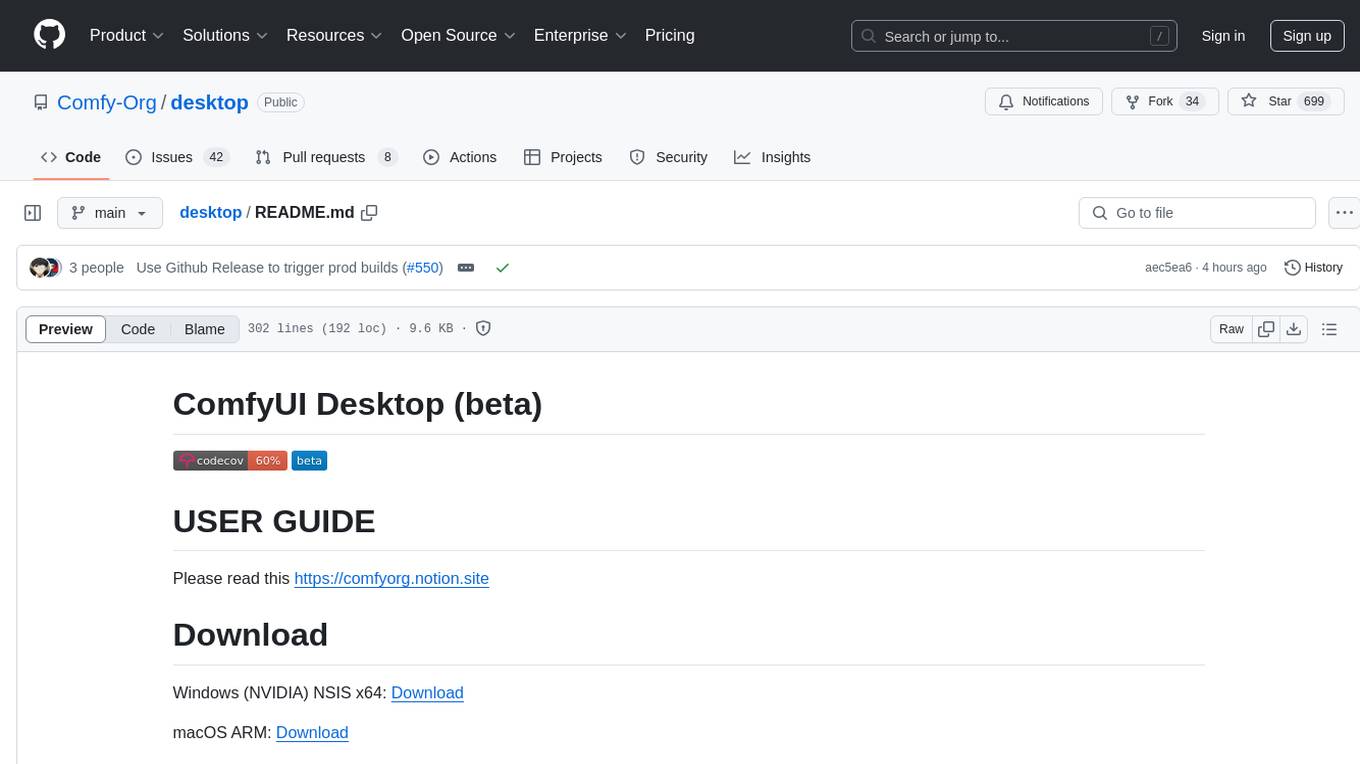
desktop
ComfyUI Desktop is a packaged desktop application that allows users to easily use ComfyUI with bundled features like ComfyUI source code, ComfyUI-Manager, and uv. It automatically installs necessary Python dependencies and updates with stable releases. The app comes with Electron, Chromium binaries, and node modules. Users can store ComfyUI files in a specified location and manage model paths. The tool requires Python 3.12+ and Visual Studio with Desktop C++ workload for Windows. It uses nvm to manage node versions and yarn as the package manager. Users can install ComfyUI and dependencies using comfy-cli, download uv, and build/launch the code. Troubleshooting steps include rebuilding modules and installing missing libraries. The tool supports debugging in VSCode and provides utility scripts for cleanup. Crash reports can be sent to help debug issues, but no personal data is included.
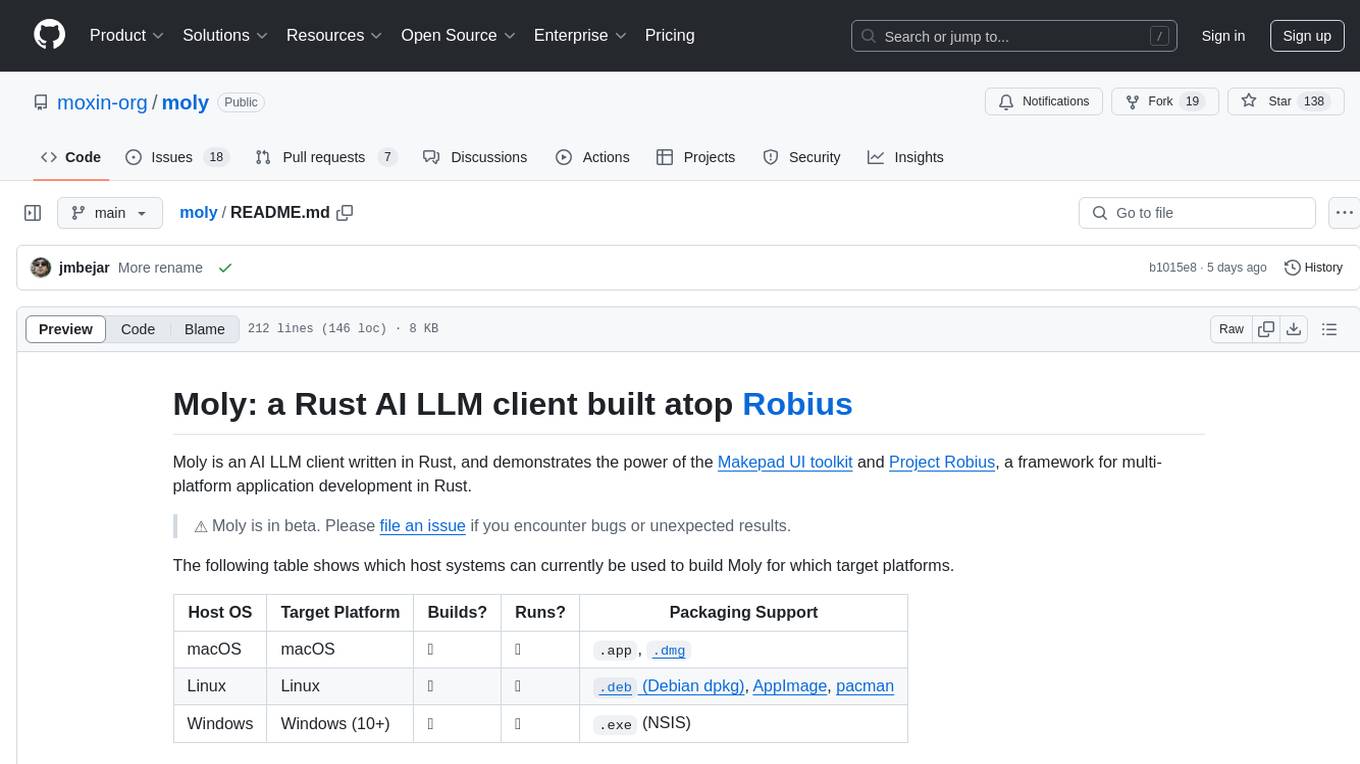
moly
Moly is an AI LLM client written in Rust, showcasing the capabilities of the Makepad UI toolkit and Project Robius, a framework for multi-platform application development in Rust. It is currently in beta, allowing users to build and run Moly on macOS, Linux, and Windows. The tool provides packaging support for different platforms, such as `.app`, `.dmg`, `.deb`, AppImage, pacman, and `.exe` (NSIS). Users can easily set up WasmEdge using `moly-runner` and leverage `cargo` commands to build and run Moly. Additionally, Moly offers pre-built releases for download and supports packaging for distribution on Linux, Windows, and macOS.
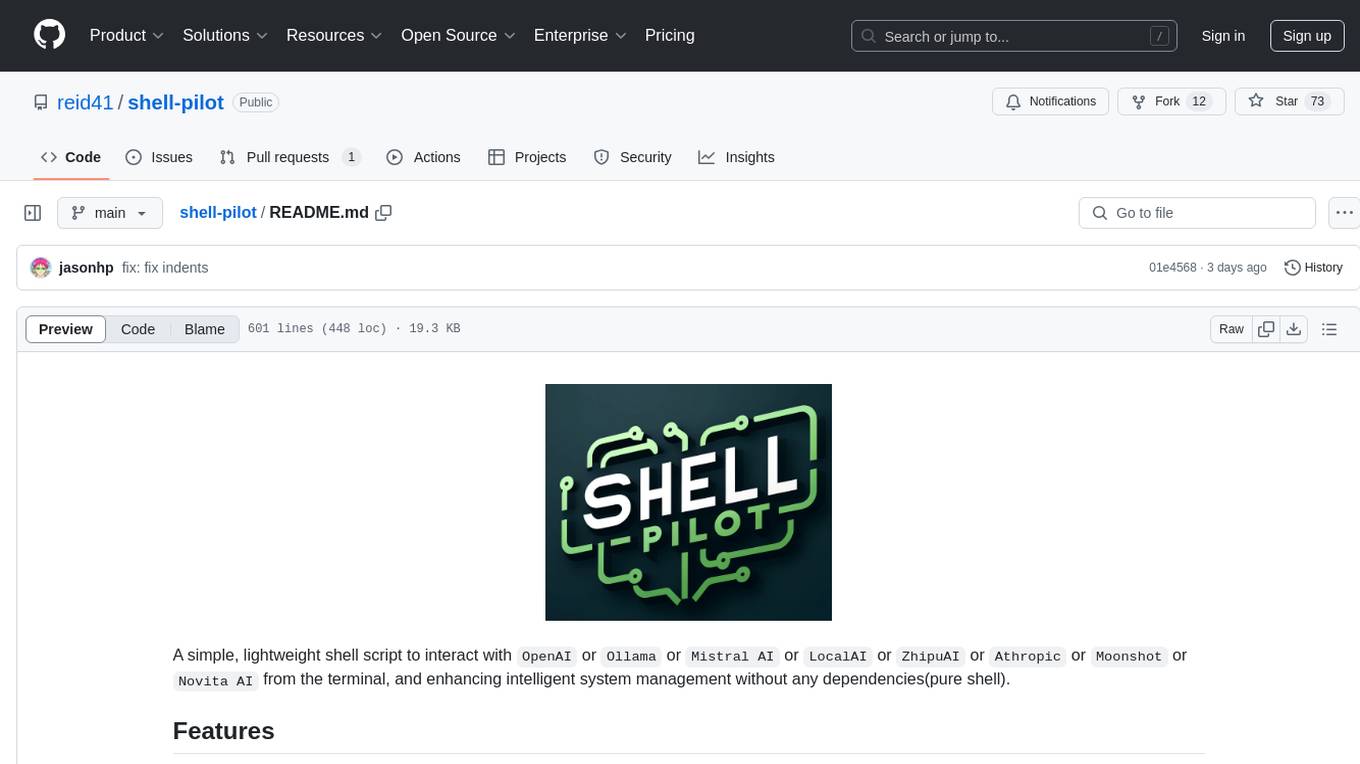
shell-pilot
Shell-pilot is a simple, lightweight shell script designed to interact with various AI models such as OpenAI, Ollama, Mistral AI, LocalAI, ZhipuAI, Anthropic, Moonshot, and Novita AI from the terminal. It enhances intelligent system management without any dependencies, offering features like setting up a local LLM repository, using official models and APIs, viewing history and session persistence, passing input prompts with pipe/redirector, listing available models, setting request parameters, generating and running commands in the terminal, easy configuration setup, system package version checking, and managing system aliases.
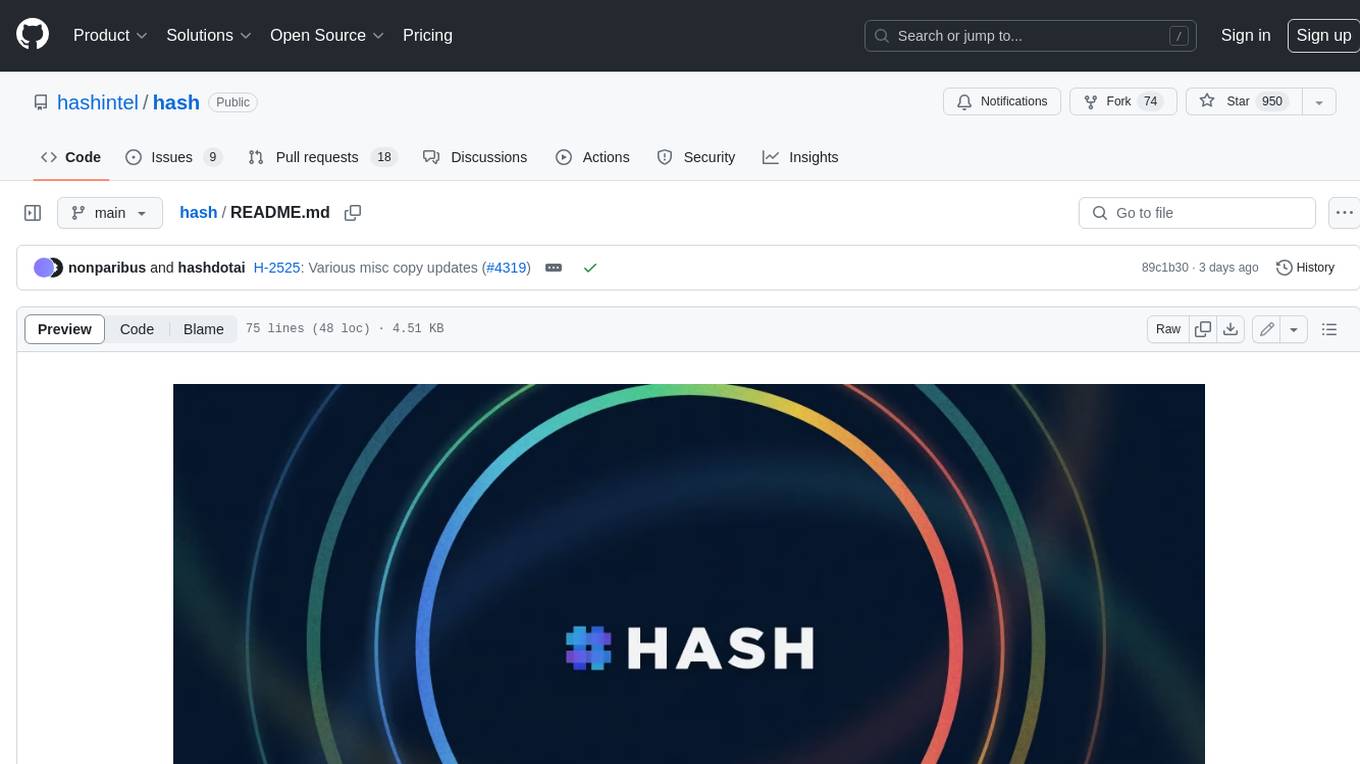
hash
HASH is a self-building, open-source database which grows, structures and checks itself. With it, we're creating a platform for decision-making, which helps you integrate, understand and use data in a variety of different ways.
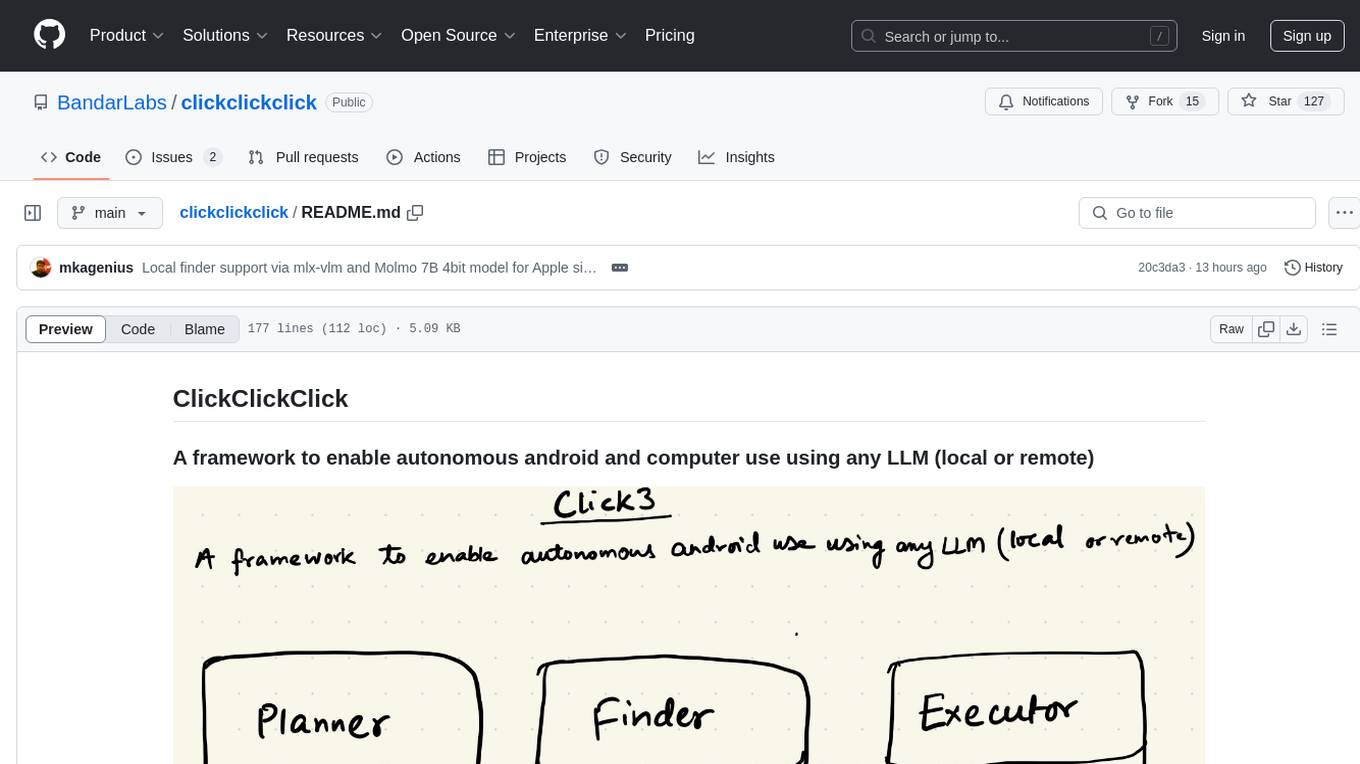
clickclickclick
ClickClickClick is a framework designed to enable autonomous Android and computer use using various LLM models, both locally and remotely. It supports tasks such as drafting emails, opening browsers, and starting games, with current support for local models via Ollama, Gemini, and GPT 4o. The tool is highly experimental and evolving, with the best results achieved using specific model combinations. Users need prerequisites like `adb` installation and USB debugging enabled on Android phones. The tool can be installed via cloning the repository, setting up a virtual environment, and installing dependencies. It can be used as a CLI tool or script, allowing users to configure planner and finder models for different tasks. Additionally, it can be used as an API to execute tasks based on provided prompts, platform, and models.
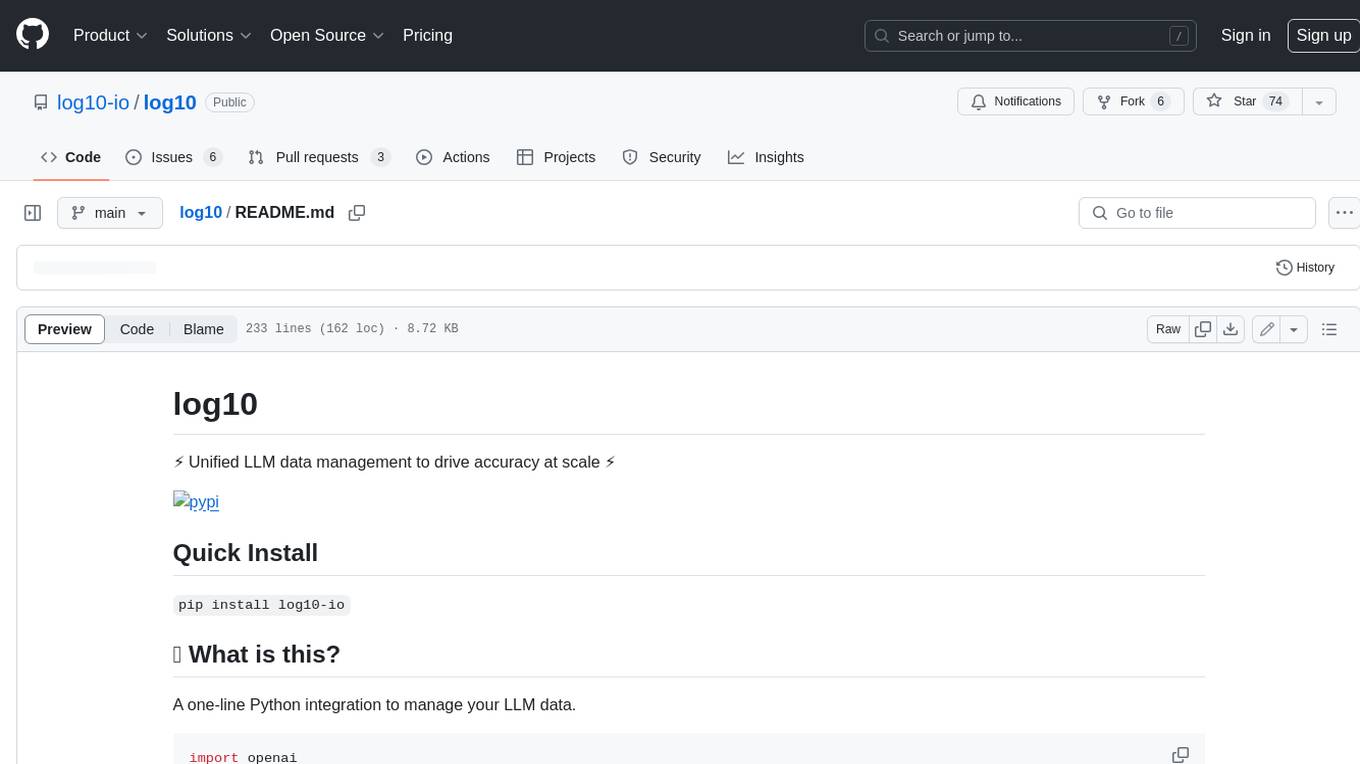
log10
Log10 is a one-line Python integration to manage your LLM data. It helps you log both closed and open-source LLM calls, compare and identify the best models and prompts, store feedback for fine-tuning, collect performance metrics such as latency and usage, and perform analytics and monitor compliance for LLM powered applications. Log10 offers various integration methods, including a python LLM library wrapper, the Log10 LLM abstraction, and callbacks, to facilitate its use in both existing production environments and new projects. Pick the one that works best for you. Log10 also provides a copilot that can help you with suggestions on how to optimize your prompt, and a feedback feature that allows you to add feedback to your completions. Additionally, Log10 provides prompt provenance, session tracking and call stack functionality to help debug prompt chains. With Log10, you can use your data and feedback from users to fine-tune custom models with RLHF, and build and deploy more reliable, accurate and efficient self-hosted models. Log10 also supports collaboration, allowing you to create flexible groups to share and collaborate over all of the above features.
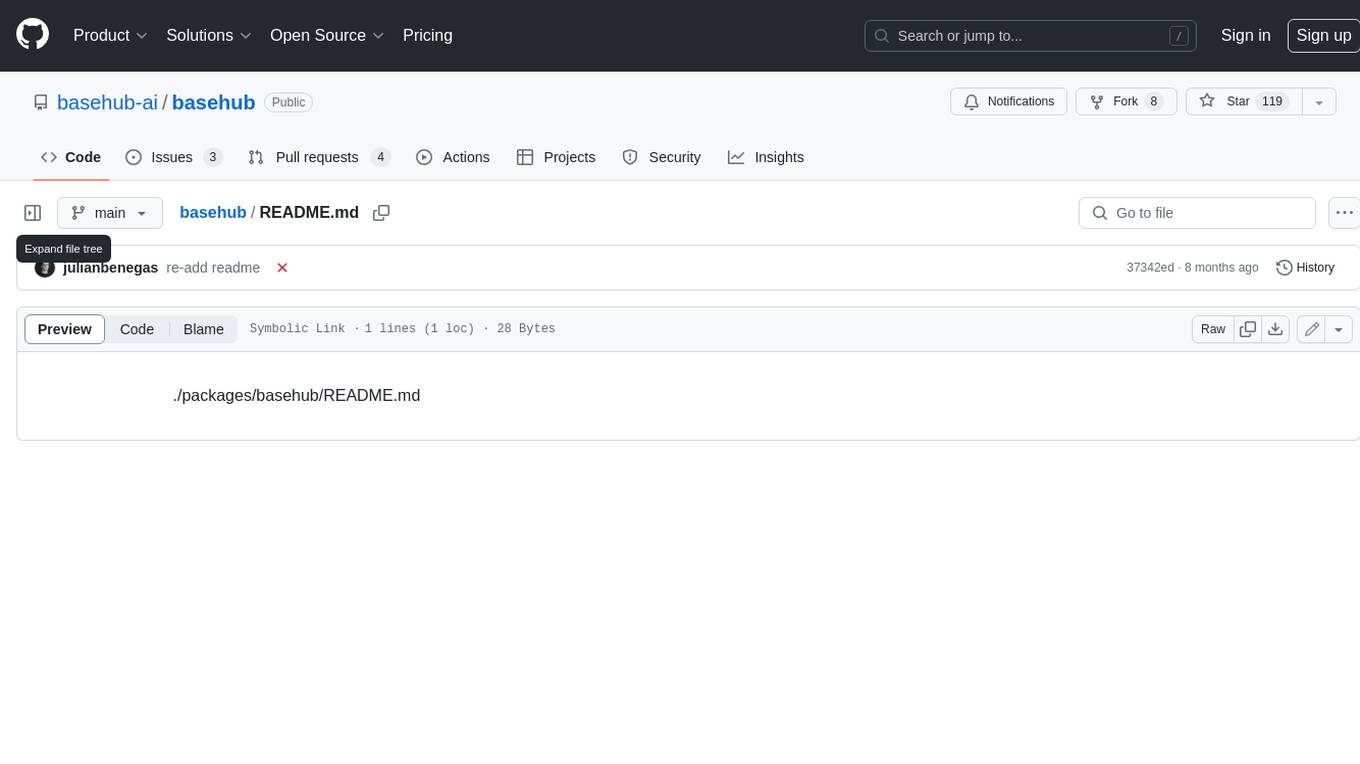
basehub
JavaScript / TypeScript SDK for BaseHub, the first AI-native content hub. **Features:** * ✨ Infers types from your BaseHub repository... _meaning IDE autocompletion works great._ * 🏎️ No dependency on graphql... _meaning your bundle is more lightweight._ * 🌐 Works everywhere `fetch` is supported... _meaning you can use it anywhere._
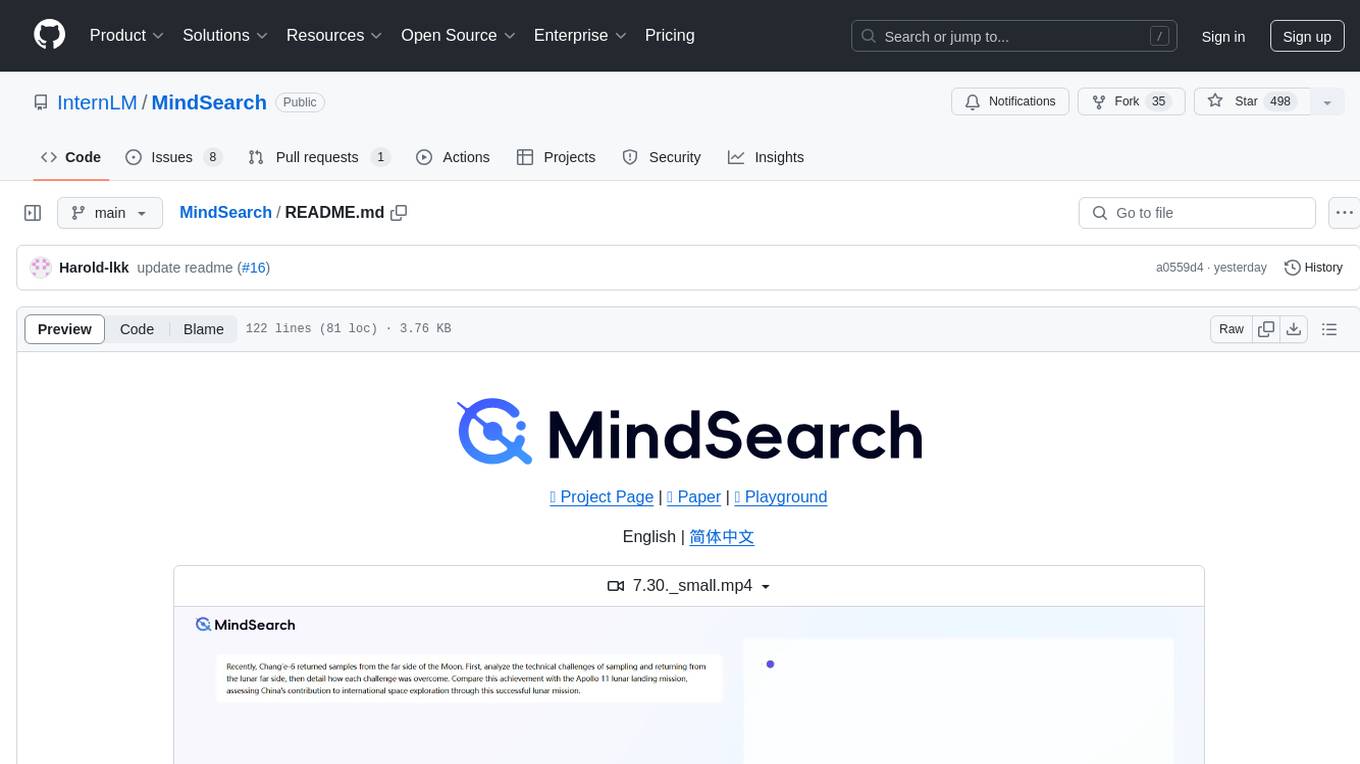
MindSearch
MindSearch is an open-source AI Search Engine Framework that mimics human minds to provide deep AI search capabilities. It allows users to deploy their own search engine using either close-source or open-source language models. MindSearch offers features such as answering any question using web knowledge, in-depth knowledge discovery, detailed solution paths, optimized UI experience, and dynamic graph construction process.
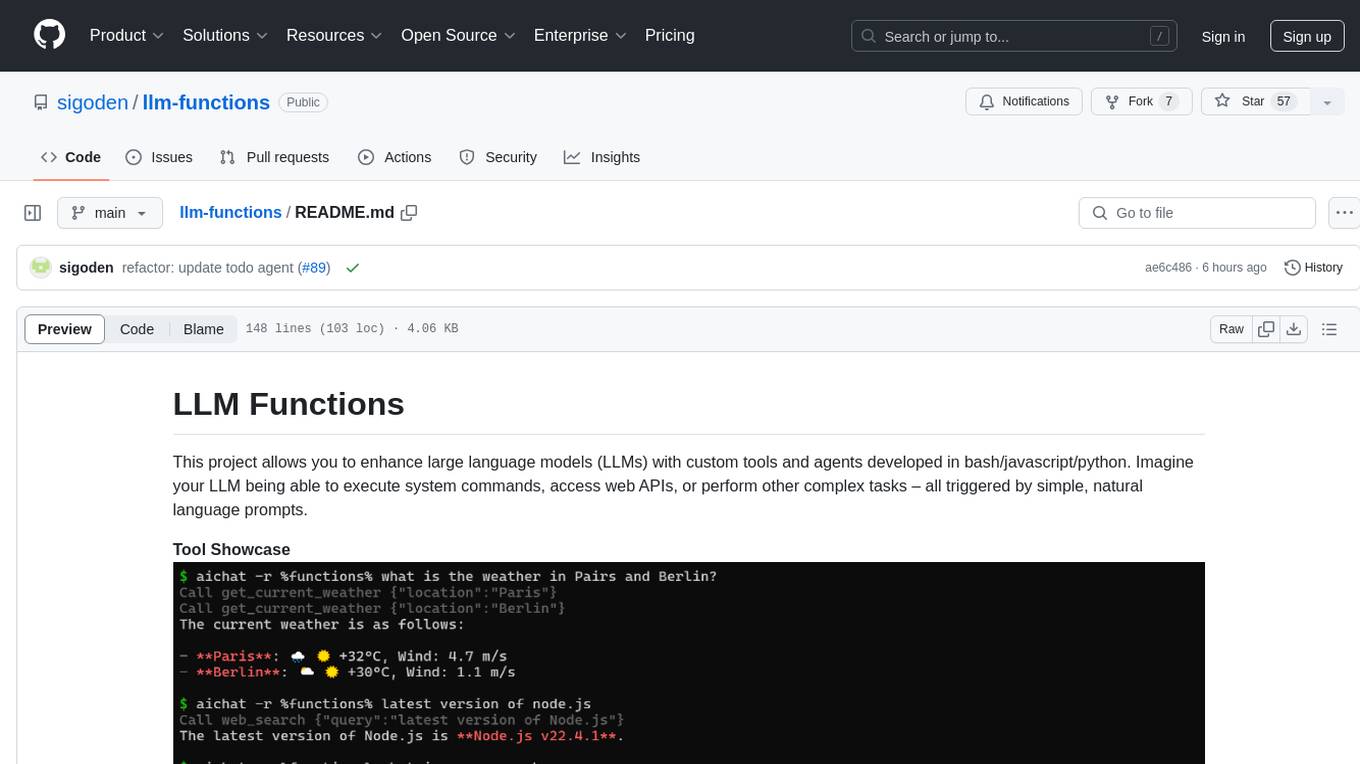
llm-functions
LLM Functions is a project that enables the enhancement of large language models (LLMs) with custom tools and agents developed in bash, javascript, and python. Users can create tools for their LLM to execute system commands, access web APIs, or perform other complex tasks triggered by natural language prompts. The project provides a framework for building tools and agents, with tools being functions written in the user's preferred language and automatically generating JSON declarations based on comments. Agents combine prompts, function callings, and knowledge (RAG) to create conversational AI agents. The project is designed to be user-friendly and allows users to easily extend the capabilities of their language models.
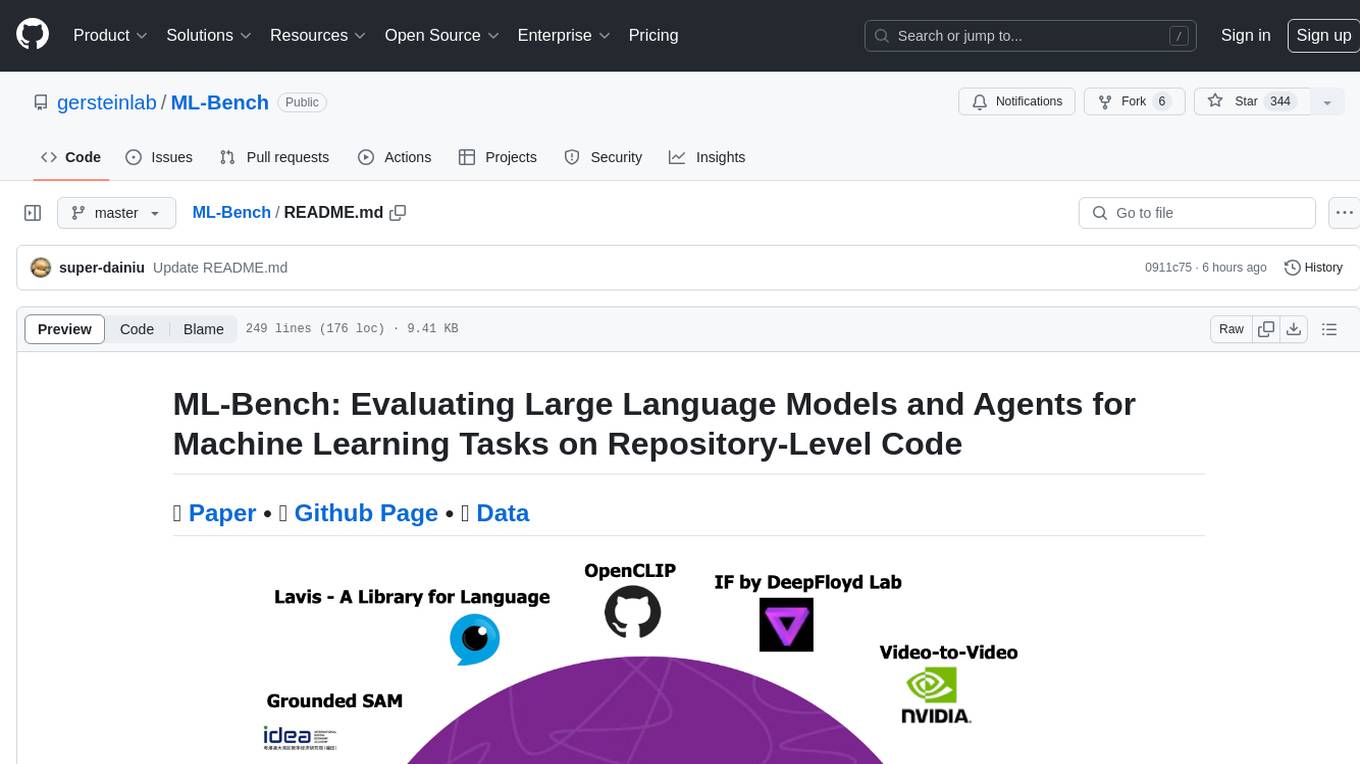
ML-Bench
ML-Bench is a tool designed to evaluate large language models and agents for machine learning tasks on repository-level code. It provides functionalities for data preparation, environment setup, usage, API calling, open source model fine-tuning, and inference. Users can clone the repository, load datasets, run ML-LLM-Bench, prepare data, fine-tune models, and perform inference tasks. The tool aims to facilitate the evaluation of language models and agents in the context of machine learning tasks on code repositories.
For similar tasks

ChatFAQ
ChatFAQ is an open-source comprehensive platform for creating a wide variety of chatbots: generic ones, business-trained, or even capable of redirecting requests to human operators. It includes a specialized NLP/NLG engine based on a RAG architecture and customized chat widgets, ensuring a tailored experience for users and avoiding vendor lock-in.

tiledesk-dashboard
Tiledesk is an open-source live chat platform with integrated chatbots written in Node.js and Express. It is designed to be a multi-channel platform for web, Android, and iOS, and it can be used to increase sales or provide post-sales customer service. Tiledesk's chatbot technology allows for automation of conversations, and it also provides APIs and webhooks for connecting external applications. Additionally, it offers a marketplace for apps and features such as CRM, ticketing, and data export.
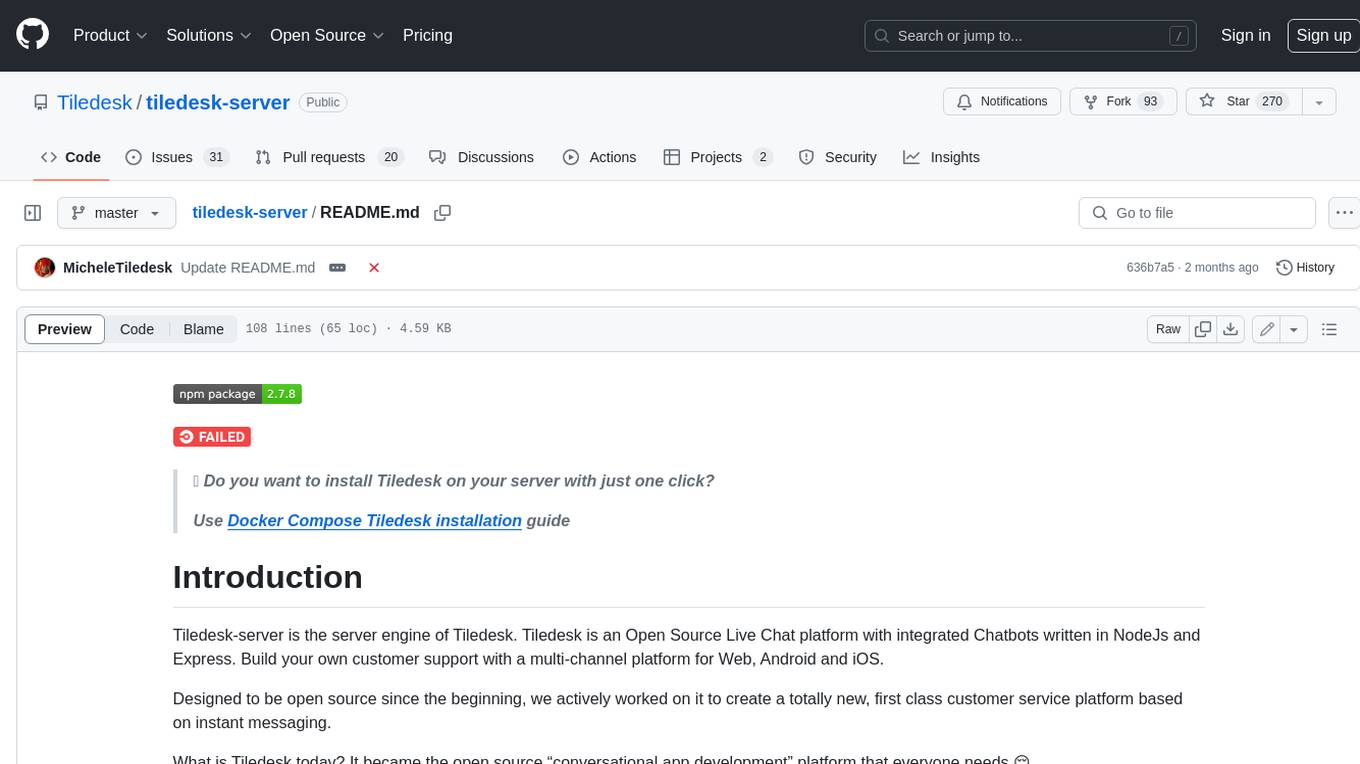
tiledesk-server
Tiledesk-server is the server engine of Tiledesk. Tiledesk is an Open Source Live Chat platform with integrated Chatbots written in NodeJs and Express. Build your own customer support with a multi-channel platform for Web, Android and iOS. Designed to be open source since the beginning, we actively worked on it to create a totally new, first class customer service platform based on instant messaging. What is Tiledesk today? It became the open source “conversational app development” platform that everyone needs 😌 You can use Tiledesk to increase sales for your website or for post-sales customer service. Every conversation can be automated using our first class native chatbot technology. You can also connect your own applications using our APIs or Webhooks. Moreover you can deploy entire visual applications inside a conversation. And your applications can converse with your chatbots or your end-users! We know this is cool 😎 Tiledesk is multichannel in a totally new way. You can write your chatbot scripts with images, buttons and other cool elements that your channels support. But you will configureyour chatbot replies only once. They will run on every channel, auto-adapting the responses to the target channel whatever it is, Whatsapp, Facebook Messenger, Telegram etc. More info on Tiledesk website: https://www.tiledesk.com. You can find technical documentation here: https://developer.tiledesk.com
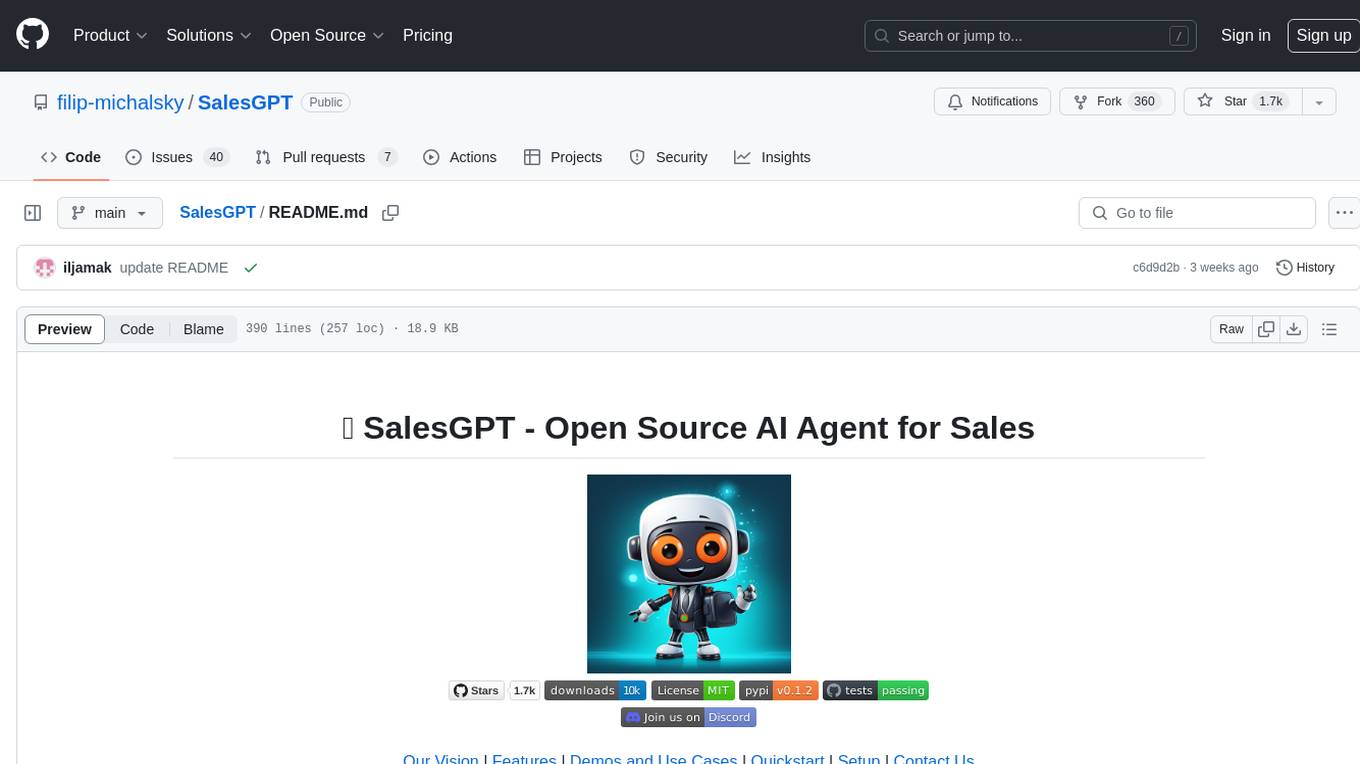
SalesGPT
SalesGPT is an open-source AI agent designed for sales, utilizing context-awareness and LLMs to work across various communication channels like voice, email, and texting. It aims to enhance sales conversations by understanding the stage of the conversation and providing tools like product knowledge base to reduce errors. The agent can autonomously generate payment links, handle objections, and close sales. It also offers features like automated email communication, meeting scheduling, and integration with various LLMs for customization. SalesGPT is optimized for low latency in voice channels and ensures human supervision where necessary. The tool provides enterprise-grade security and supports LangSmith tracing for monitoring and evaluation of intelligent agents built on LLM frameworks.
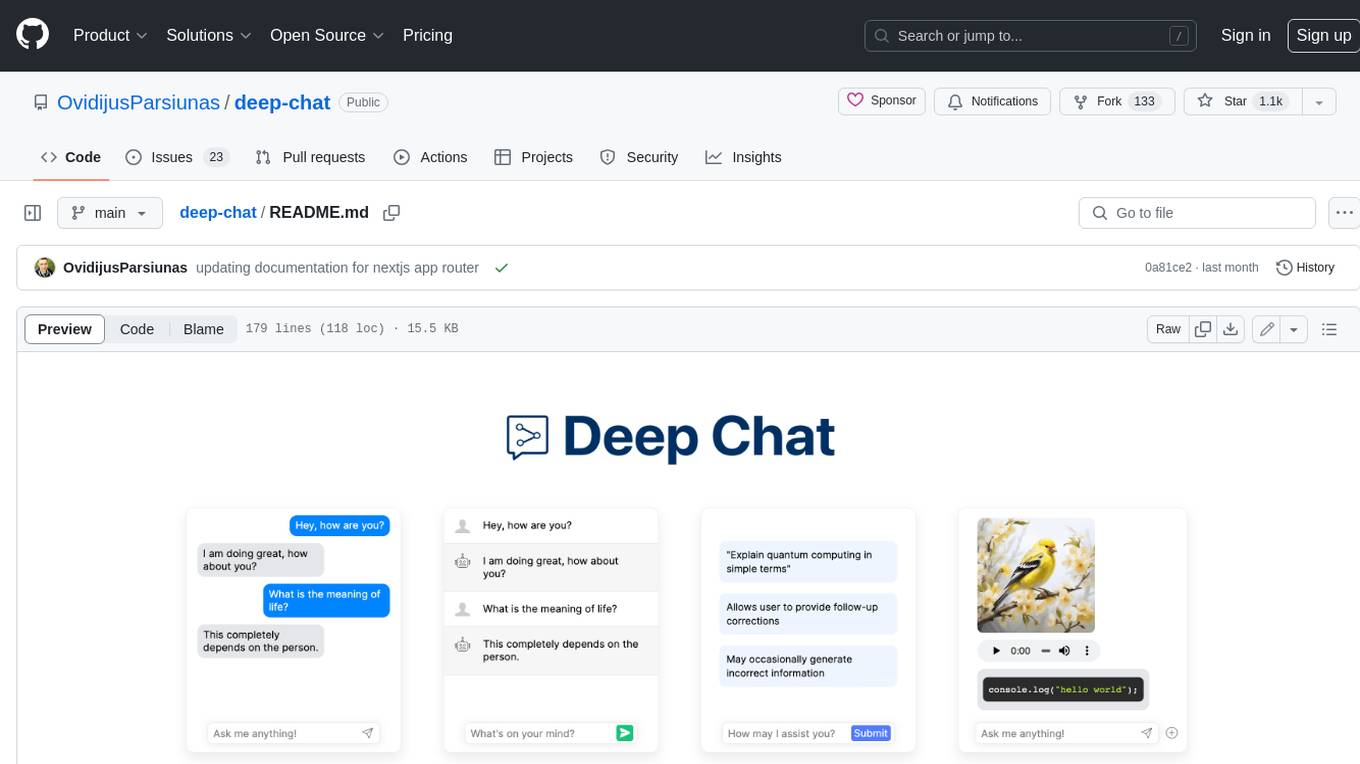
deep-chat
Deep Chat is a fully customizable AI chat component that can be injected into your website with minimal to no effort. Whether you want to create a chatbot that leverages popular APIs such as ChatGPT or connect to your own custom service, this component can do it all! Explore deepchat.dev to view all of the available features, how to use them, examples and more!
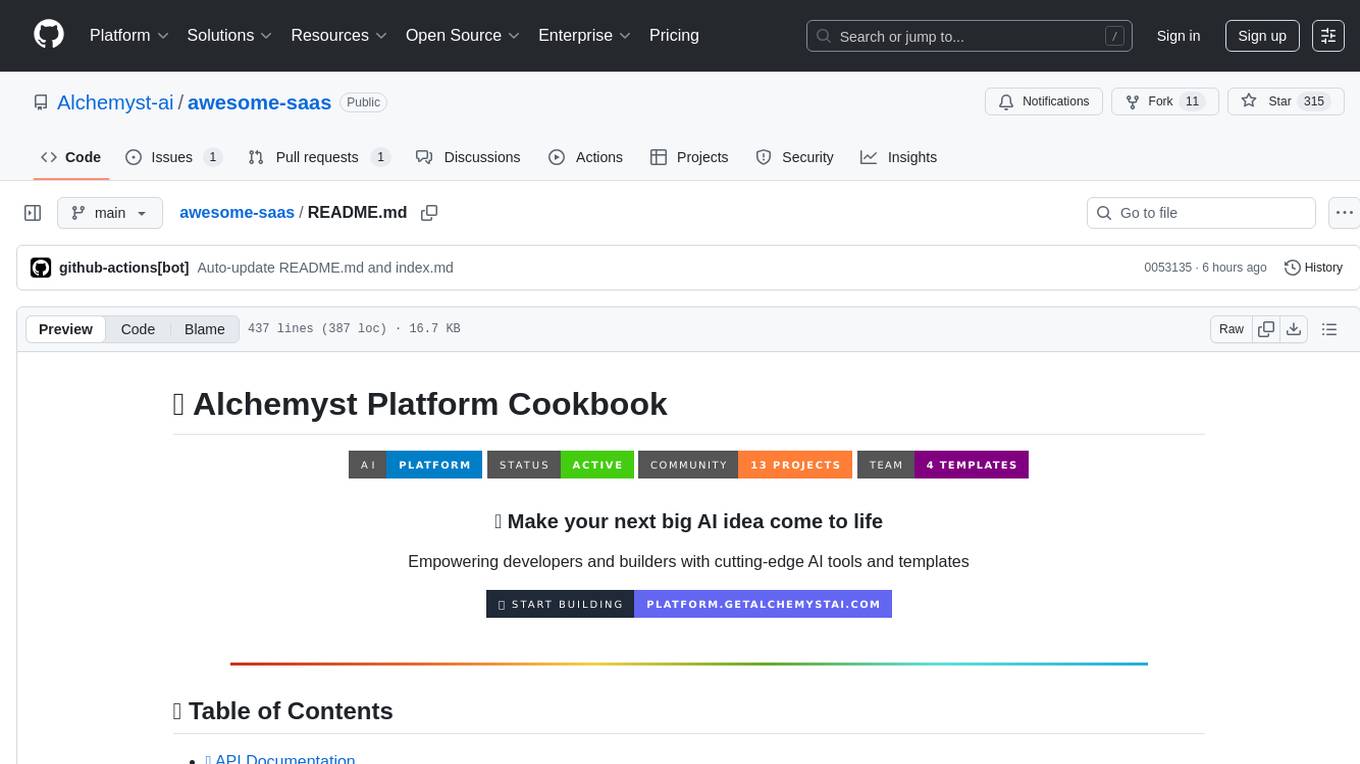
awesome-saas
The Alchemyst Platform Cookbook is a comprehensive guide for developers and builders to bring their AI ideas to life. It provides cutting-edge AI tools and templates to empower users in creating innovative projects. The platform offers API documentation, quick start guides, official and community templates for various projects. Users can contribute to the platform by forking the repository, adding the topic 'alchemyst-awesome-saas', making their repository public, and submitting a pull request. Troubleshooting guidelines are provided for contributors. The platform is actively maintained by the Alchemyst AI Team.
For similar jobs

ChatFAQ
ChatFAQ is an open-source comprehensive platform for creating a wide variety of chatbots: generic ones, business-trained, or even capable of redirecting requests to human operators. It includes a specialized NLP/NLG engine based on a RAG architecture and customized chat widgets, ensuring a tailored experience for users and avoiding vendor lock-in.

anything-llm
AnythingLLM is a full-stack application that enables you to turn any document, resource, or piece of content into context that any LLM can use as references during chatting. This application allows you to pick and choose which LLM or Vector Database you want to use as well as supporting multi-user management and permissions.

chatbot-ui
Chatbot UI is an open-source AI chat app that allows users to create and deploy their own AI chatbots. It is easy to use and can be customized to fit any need. Chatbot UI is perfect for businesses, developers, and anyone who wants to create a chatbot.

deep-chat
Deep Chat is a fully customizable AI chat component that can be injected into your website with minimal to no effort. Whether you want to create a chatbot that leverages popular APIs such as ChatGPT or connect to your own custom service, this component can do it all! Explore deepchat.dev to view all of the available features, how to use them, examples and more!

Avalonia-Assistant
Avalonia-Assistant is an open-source desktop intelligent assistant that aims to provide a user-friendly interactive experience based on the Avalonia UI framework and the integration of Semantic Kernel with OpenAI or other large LLM models. By utilizing Avalonia-Assistant, you can perform various desktop operations through text or voice commands, enhancing your productivity and daily office experience.
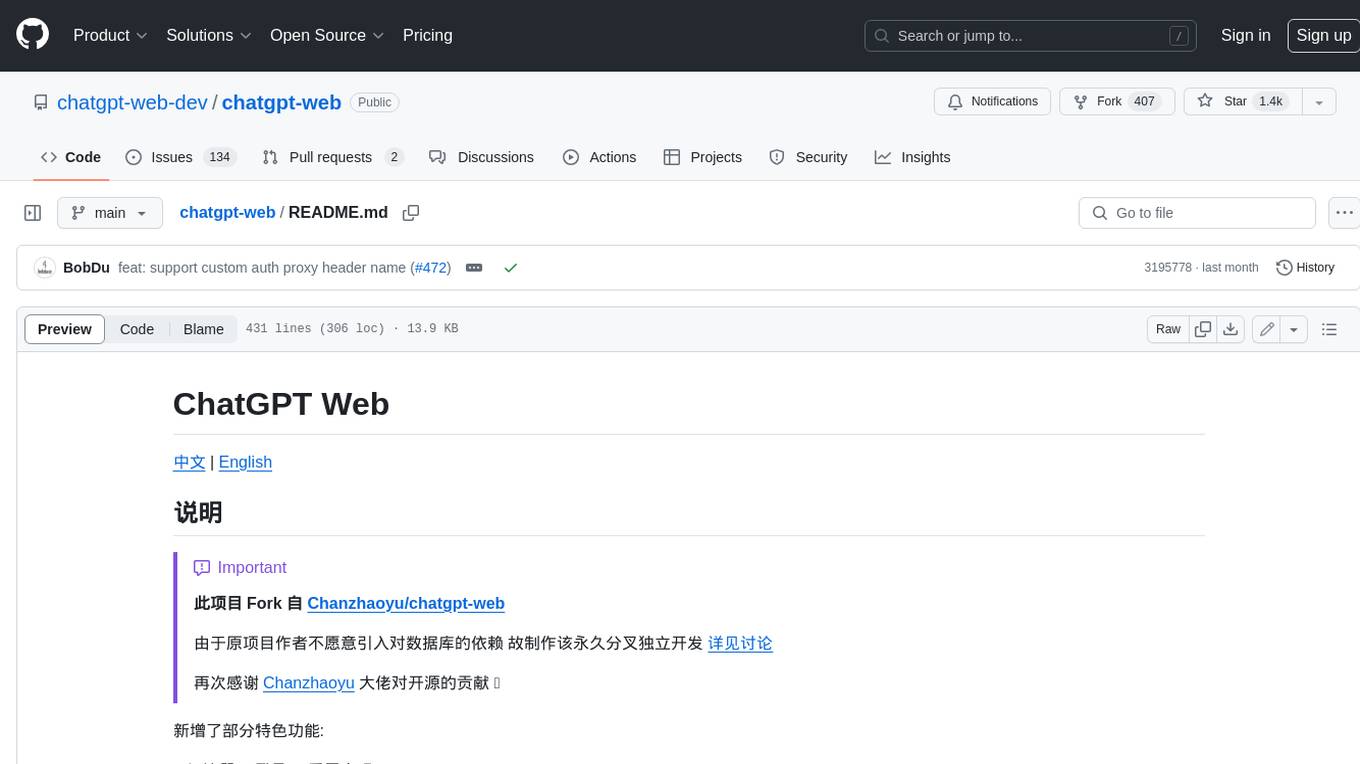
chatgpt-web
ChatGPT Web is a web application that provides access to the ChatGPT API. It offers two non-official methods to interact with ChatGPT: through the ChatGPTAPI (using the `gpt-3.5-turbo-0301` model) or through the ChatGPTUnofficialProxyAPI (using a web access token). The ChatGPTAPI method is more reliable but requires an OpenAI API key, while the ChatGPTUnofficialProxyAPI method is free but less reliable. The application includes features such as user registration and login, synchronization of conversation history, customization of API keys and sensitive words, and management of users and keys. It also provides a user interface for interacting with ChatGPT and supports multiple languages and themes.

tiledesk-dashboard
Tiledesk is an open-source live chat platform with integrated chatbots written in Node.js and Express. It is designed to be a multi-channel platform for web, Android, and iOS, and it can be used to increase sales or provide post-sales customer service. Tiledesk's chatbot technology allows for automation of conversations, and it also provides APIs and webhooks for connecting external applications. Additionally, it offers a marketplace for apps and features such as CRM, ticketing, and data export.
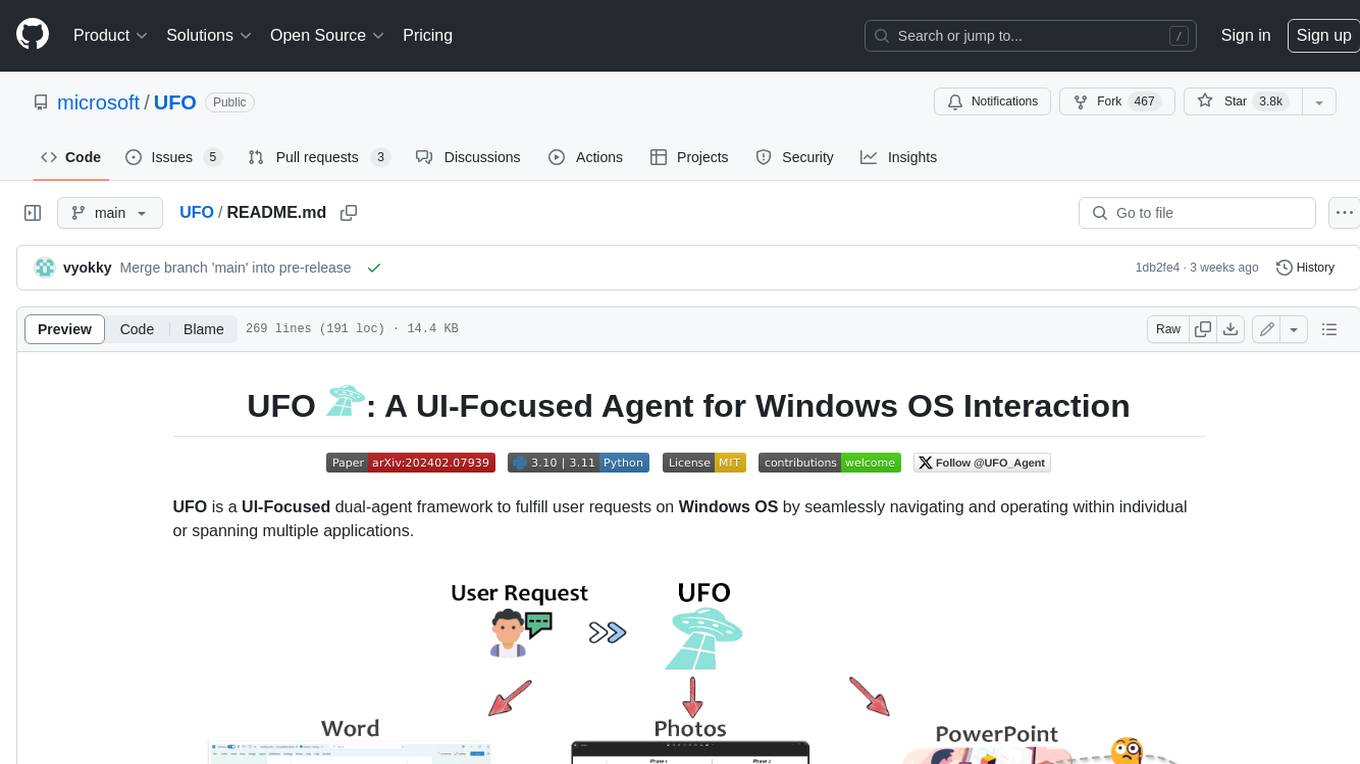
UFO
UFO is a UI-focused dual-agent framework to fulfill user requests on Windows OS by seamlessly navigating and operating within individual or spanning multiple applications.

